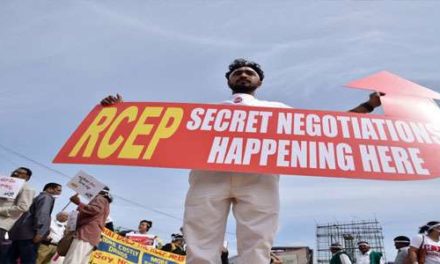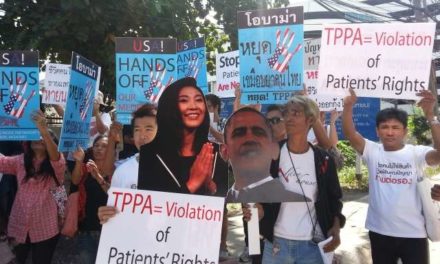Economies around the world, and those in the developing world in particular, face monumental challenges from the COVID-19 pandemic and its consequences. The unprecedented lockdown announced by Governments in order to contain the spread of the virus has brought to the fore a serious crisis of livelihoods stemming from the extensive closure of businesses and economic activity. So, if protecting lives is imperative, this should include steps that society must consider in order to prevent hunger, malnutrition and destitution on a scale that human civilisation has not seen for decades.
For over four decades, countries across the development spectrum knew only one mantra of economic governance; that irrespective of economic circumstances, the market mechanism would provide the solutions. They believed that the sleight of the “invisible hand” would correct the worst of instabilities, since the market had the power to correct itself. This mantra came from Washington, as the consensus between powerful corporations and their backers at the World Bank and the International Monetary Fund (IMF). Their sole objective was to expand the reach of multinational corporations through the policies of (economic) liberalisation, privatisation (of assets held by the State, created by tax payers) and globalisation of economies, essentially to allow international finance to gain ascendancy.
The only substantial outcome of the “Washington Consensus” that kept getting reinforced was increasing inequality between and within countries. Over the decades, while the share of wages in the total value added by the factories is at a historical low, profits received by the capitalists are pushing towards their highest. More than 90 per cent of the workforce have no job security, leave alone, social security, on which they can depend during harsher times. The severe exploitation of peasants (almost 90 per cent of the total farming community) by the middlemen ruling the agriculture markets has long threatened to make farming an unviable occupation. Strangely, those responsible for economic governance had little concern that a crisis in the farming sector could push countries in the developing world into the dire straits of food insecurity.
Despite protests spilling over onto the streets on multiple occasions, these unacceptable conditions facing the working class were rarely acknowledged by the ruling elites and many in the upper middle classes. This ugly side of the society we are a part of has now been exposed by the COVID-19 pandemic. The plight of the tens of millions that are filling the global media space are but chronicles of misery that the market-dominated economic system has been heaping on the working class in a myriad of ways. The biggest irony is that this exploitative economic system has flourished, in front of our eyes, in the presence of a democratic polity. But this democracy is not of the kind that are taught in classrooms; it is one where the people only provide legitimacy to those ruling the country, in other words, it is only, “by the people”, but the ruling elite is “for market fundamentalism” and “of market fundamentalism” –an ideology that goes against the people who elect the government.
COVID-19 has changed the economic reality of our past several decades in two fundamental ways: first, it has led to a complete collapse of the market that was driving the economy and the polity, and, second, and more importantly, the governments are now being directly confronted with the miseries of the same people who had elected them to the positions of power. This has created an unprecedented situation, wherein the governments have to address the plight of the person on the street; because the longer they take to respond, the further they would be away from getting back to any semblance of normalcy.
Response of Major Economies
The response of the governments must be two-fold: first, they must take a series of immediate short-term measures to save lives and livelihoods impacted by the pandemic and the lockdown, and, second, they have to take a step back from the economic model that keeps an overwhelmingly large share of the working class and small producers in a state of abject misery with no reserves or resilience. Equitable sharing of economic benefits, an idea currently confined to national and international declarations, must be made a reality.
What do governments need to do immediately? The first step would be to provide an adequate economic stimulus to save lives and livelihoods. Western governments have already taken a number of initiatives to rescue their economies from total collapse. The United States announced a $ 2 trillion economic stimulus package, or nearly 10 per cent of the country’s gross domestic product (GDP) to help individuals with unemployment benefits, to assist big and small businesses in their re-building process, and to support the farm sector by enhancing subsidies. Funds have also been allocated to increase public spending on health care and education. The Federal Reserve, the central bank of the country, has more than matched the efforts of the government to help in the revival of businesses as a step towards getting jobs back.
Other major economies, including Germany, Japan and France have also announced economic stimulus packages that are between 15 to 20 per cent of their respective GDPs. Like in case of the US, the governments in these countries have also focused on getting their domestic enterprises back in business. These governments have increased their spending and to therefore increase their fiscal deficits. They have shed their policies of fiscal prudence, long advocated by the IMF.
The focus of the major economies on strengthening their domestic production facilities has two facets: the first is to ease the burden on companies and through this ease part of the huge burden of unemployment, and the second, reducing the dependence on international markets. The second facet is particularly important, as it seems that for the first time since there is a move to look beyond the long shadow of globalisation. Part of this thinking could also be induced by the fact that China seems to have been working its way out of the challenges posed by COVID-19, and is therefore well placed to put its production sector back on track, months before its competitors will be able to do so. The global community should also be aware that China has capacities to meet any economic crisis more resolutely than any other country. Twice, in the past two decades, China has been able to rebound back from economic downturns and consolidate its position in the global economy. The first was after the economic downturn following the terrorist attack on the World Trade Center in New York in 2001 and the second was after the 2008 economic recession. There are no reasons why China cannot do the same, especially from its current advantageous position. China as the leader of the globalised world would be unacceptable to many major economies, and hence they could take a few steps back to rely more on their own domestic demand to act as the driver for their economies.
What India Needs to Do
Given the trends being witnessed across countries, it is somewhat surprising that the Government of India has not yet announced a significant economic stimulus package. The only measure announced thus far is the Rs. 1.7 lakh crore package under Pradhan Mantri Garib Kalyan Yojana. If existing allocations are discounted, it is just 0.5 per cent of the country’s GDP. Further, the people need substantially more than the Rs. 500 per month that has been allocated to the poor in this package.
How does one explain this tendency of the government to largely buck the global trend? One possibility is that the fiscal conservatives in the government are holding firm against breaching the fiscal deficit target of the Fiscal Responsibility and Budget Management (FRBM) Act, 2003. Over the past several months, the sluggishness in the Indian economy demanded a more aggressive fiscal policy, but the government continued to repose faith in monetary policy with the Reserve Bank of India (RBI) lowering the cost of borrowing to “attract” investors. Strangely, even as the market has completely collapsed, the RBI seems to believe that increasing liquidity in the system is the way forward and hence its recent decision to decrease the repo rate.
With the country facing an unprecedented economic distress, the worst since independence, the government’s failure to announce an economic stimulus package is bewildering, to say the very least. The government must recognise that it has to increase its market borrowing by dipping into the considerable liquidity that exists in the market, and forego its avowed objective of fiscal prudence, which is also being advised by the International Monetary Fund (IMF). In its recently unveiled Fiscal Monitor for April 2020, the Fund commented thus, “In India, the fiscal stance should be eased as needed to accommodate necessary increases in public health expenditure in response to the pandemic and shield against a more severe economic downturn …”
There should be no doubt that if the government does decide on an economic stimulus package, it should refrain from being heavily corporate sector driven. For providing a sustained boost to the economy, the package must have two clear objectives: one, addressing the plight of the working class, especially the migrant labour that has lost its means of survival, and, two, supporting an already distressed agriculture and allied sectors such as fisheries, which now faces the additional burden of reverse migration. Further, government agencies must be prepared to procure the Rabi harvest in much larger quantities, since private markets have all but collapsed due to the lockdown.
Moreover, the government could take a cue from countries that have announced stimulus packages to support payment of wages, for instance, Bangladesh’s support to the garment industry, which supports a large female workforce. Small businesses would also need significant handholding if they are to help the Indian economy to get back on track. And, finally, this is the opportune moment for strengthening the country’s beleaguered public health system. There should be a massive push for public investment in health care and other essential services. For instance, India has one of the lowest government expenditure on health at around 1.3 percent of GDP, while the World Health Organisation (WHO) recommends at least five percent. When governments provide quality essential services for free or low cost, people have more money available to contribute to re-start demand. If services are free people can use that money for other necessities. But to be effective, this investment has to translate into provision of these services by public entities, and not left to fund the profits of private companies that sell these essential services.
An Agenda for the Government
- The government must announce a substantial economic stimulus immediately and ensure that this addresses the problem of widespread unemployment, non-payment of wages and depressed wages resulting from closure of factories, relieves prevailing distress in agriculture, assists sectors like transportation that support the economic sectors and provides assistance to traders.
- Government should give up its fiscal prudence and should not limit the fiscal deficit to the maximum provided in the FRBM Act, namely 3.5 per cent of the GDP
- Immediately issue an ordinance to amend the FRBM.
- Increasing the limits on the size of the deficit; this should be kept flexible
- Remove the limits set on general Government debt (60 per cent of GDP) and Central Government debt (40 per cent of GDP)
- States should be given autonomy to borrow and spend more and to therefore increase their support to health, hygiene and education, and expand social protection
- To stem the destabilising outflows from the Indian financial markets and the resultant devaluation of the rupee, the RBI should deploy capital controls (such as an exit tax) and shore up financial regulations.
- Food credit will have to go up quite substantially, enabling the Food Corporation of India (FCI) to procure in much larger quantities than it has done in the normal years
- Storage capacities of FCI need to be enhanced immediately to enable proper storage of food grains in much larger quantities this year; decentralised procurement must be supported to enable PDS entitlements to be stored within the area of the entitled population
- Provisions should be made for free distribution to all those in need of the food grain stocks that the FCI is currently holding
- Government has to urgently support the Micro, Small and Medium Enterprises (MSME) sector to address the problem of job losses facing millions of workers. The MSMEs need a comprehensive financial package to overcome cash flow problems. Such a package could include tax relief, loan repayment holidays, credit guarantees, issuance of an overdraft facility, and new relief loans at concessional rates. A quick recovery is only feasible if MSMEs remain in business.
- Reviving domestic economy should be the focus of the stimulus package by focusing on living wages, capacity and job creation, and with fullest use of domestic resources and capabilities.
- The national rural employment guarantee scheme must immediately be strengthened and expanded into the urban areas as well. The state of Kerala’s Ayyankali urban employment guarantee scheme can provide useful pointers for the latter.
- Significantly increase public investment in health care and other essential services and increase the capacity of the public sector to provide these services
- Priority must be given to the indigenous development of critical industries/sub-sectors such as electronics through active involvement of the public sector
- Production of active pharmaceutical ingredients (APIs) must be taken up immediately to ensure that these intermediates meet the requisite global standards. Through this import dependence on China can be drastically reduced
- Local production of medical equipment, including production personal protection equipment, gloves and mask, must be increased to ensure that the country does not remain dependent on imports
- Recognise the importance of the local economy, in particular, the importance of the contribution of informal workers
- Workers in the unorganised sector and informalised workers in the organised sectors must be provided social security benefits
- The benefits of Employees’ State Insurance (ESI) must be extended to them
- Retaining policy flexibility is important must be the primary objective; the government must take the next steps for economic revival in a coordinated and planned manner
- India should not sign or negotiate any bilateral, plurilateral and multilateral trade and investment agreements during this crisis period. This will ensure maximum policy flexibility to be able to design our future economic and associated trade policy for required self-reliance in areas of economic and social need and capacity.
- The Government should remain vigilant of foreign investors launching claims under investor-state dispute settlement (ISDS) of existing investment treaties and take all precautionary steps to suspend the arbitration related to policy measures taken to fight against the COVID-19 crisis.
Issued by:
- All India Drug Action Network
- Centre for Financial Accountability
- Focus on the Global South
- Forum for Trade Justice
- India FDI Watch
- Indian Social Institute, Delhi
- Initiative for Health & Equity in Society
- IT for Change
- Madhyam
- Third World Network (TWN) Trust
Individuals:
- Biswajit Dhar, Jawaharlal Nehru University (JNU), New Delhi
- Dinesh Abrol, Former Chief Scientist CSIR-NISTADS
- Dr Mira Shiva, New Delhi
- K T Suresh, ActionAid Association
- S. Chalapati Rao, Economist, Delhi
- Kapila Gureja, Bodhayan.
- Nachiket Udupa
- Ambedkar, Researcher, Tricontinental Institute for Social Research
- Paranjoy Guha Thakurta, New Delhi
- Radha Holla Bhar
- Ramaa Arun Kumar, Economist, New Delhi
- Rosamma Thomas
- Smitha Francis, Economist, New Delhi
(Signatories as of 10 May 2020)









